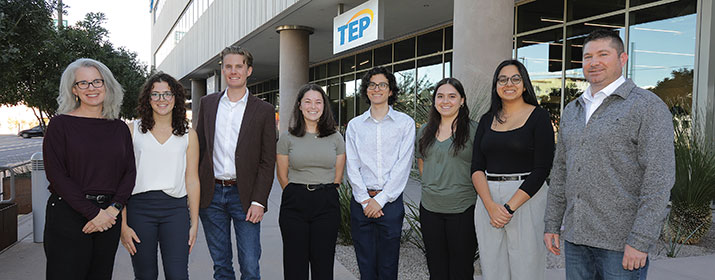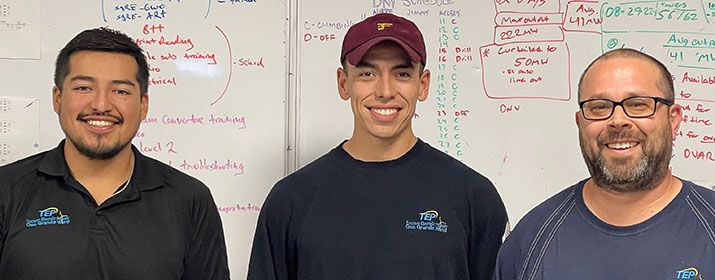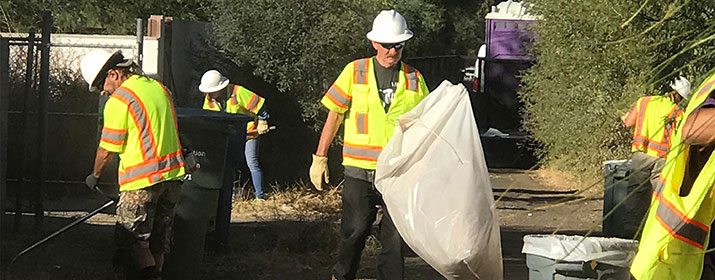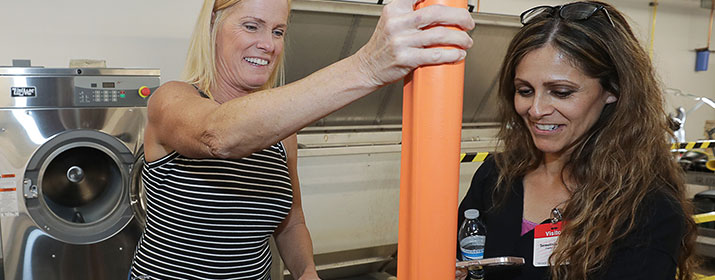
University of Arizona students are analyzing energy needs for Tucson Electric Power through a new partnership that helps them develop workplace skills.
This past summer, TEP contracted with the university’s Eller College of Management to select undergraduate students for a project to evaluate fuel costs and energy consumption.
TEP was among the first sponsors of Eller’s Immersion Learning Projects program, which began in early 2023. Previously, TEP worked with graduate students through the Eller Business Consulting Program, in which students work alongside companies on a semester-long project.
While the new program benefits undergraduates’ education, it also allows TEP to tap into students’ expertise.
“We’ve been impressed with what they’ve developed for TEP,” said Nick Jacobs, Manager of Day-Ahead Market Operations and Origination for TEP’s Wholesale Marketing team. Jacobs is overseeing the students’ work at TEP. “It’s also been great to be able to show the students the challenges we’ve overcome and the success we’ve had in transitioning to a cleaner generation portfolio,” he said.
TEP maintains a longtime relationship with Eller. President and CEO Susan Gray is a member of Eller’s National Board of Advisors and initiated the Immersion Learning Project at TEP.
Through the Eller program, six undergraduate students from Eller and W.A. Franke Honors colleges work together over a semester or summer on projects that companies can use directly in operations. At TEP, students are working with the Wholesale Marketing team to put together an analytical model that shows various aspects of electric generation, including fuel costs, wholesale revenues, profits and losses. With that information, the Wholesale Marketing team plans to identify areas of improvement and value to the company.
The first team of students was assigned to the TEP project during the 2023 summer session. Some of the students carried over to the second team in fall 2023, which concluded its work with a presentation in December. The next stage of the project is starting in the 2024 spring semester. TEP also taps faculty expertise for the project.
University of Arizona junior Isa Baron started with the program in the summer and continued in the fall. Her classwork is well aligned with TEP’s mission, as she is double majoring in Environmental Studies and Operations & Supply Chain Management with a minor in Sustainable Mineral Resources.
“I’ve been interested in renewable energy and its increasing demand. When I was told that TEP was looking at the energy portfolio, I was immediately interested,” Baron said.
The project has given her a better understanding of energy markets and the industry, which she hadn’t previously studied. The partnership reaffirmed her desire for future work as a sustainability consultant with an emphasis on energy and minerals.
“It’s cool to see the reality of the energy industry,” Baron said. “The partnership has been a great opportunity and not something that could be found in a classroom environment. It’s been an enriching experience that we can all translate to our individual career fields.”
Kavya Shri, a senior majoring in Economics and Math, saw the program as an opportunity she couldn’t find on campus as well as a chance to develop her coding skills. She helped create an online dashboard, work she began in the summer and continued in the fall semester.
“It’s been a self-learning journey, improving my Python (coding) skills. I’m really invested in the code because I built it from scratch. I wanted to see it through,” Shri said.
While Shri plans to pursue academia as a career, she said the work at TEP has been valuable.
“I appreciate having the opportunity to get the perspective on the other side, on what day-to-day problem-solving looks like in a company,” Shri said.
While the Eller program has started small, Eller plans to expand it to almost 100 students by the end of the school year, said Anastasiya Ghosh, Associate Dean of the Eller College of Management Partnerships.
TEP pays a fee for Eller’s services, including stipends for students. This increases the accessibility for students who might not be able to afford the time commitment otherwise.
“Students get exposed to the industry. Our students have to pick up a lot of knowledge and also get excited about jobs. It’s a way for companies to review talent at that level and have those engagements,” Ghosh said.






